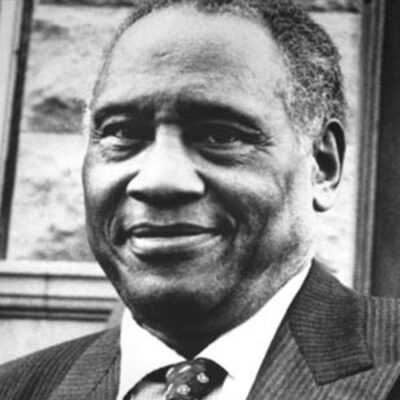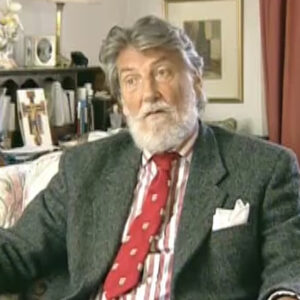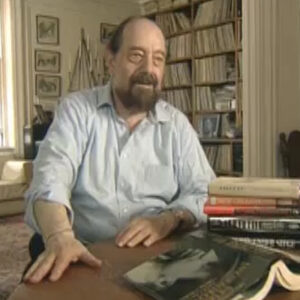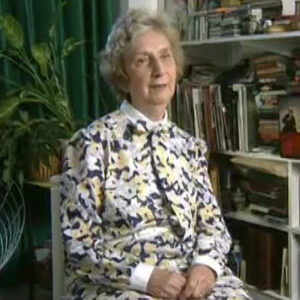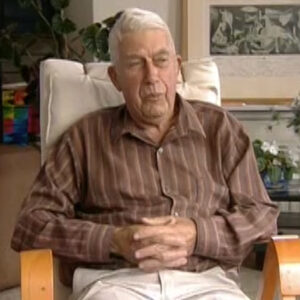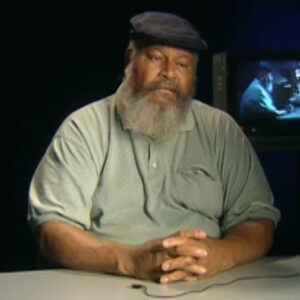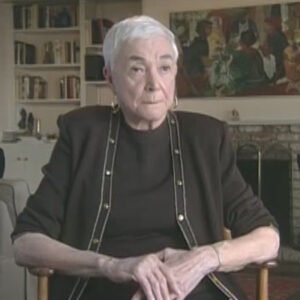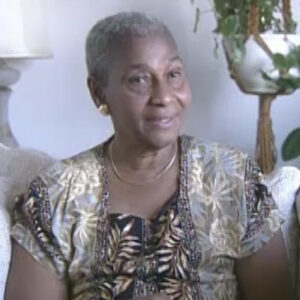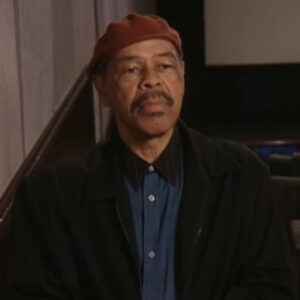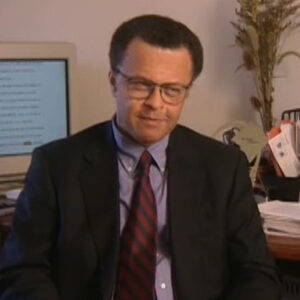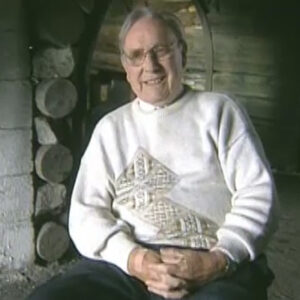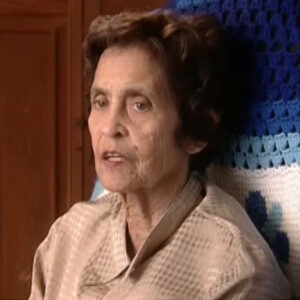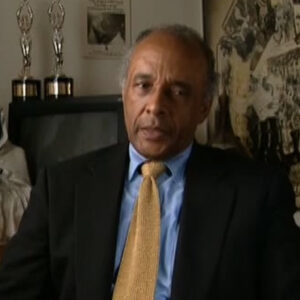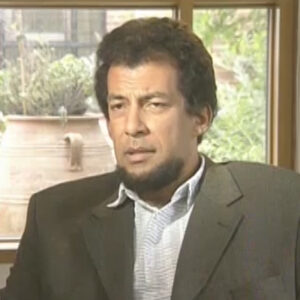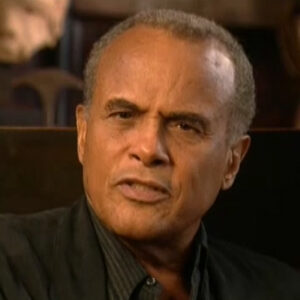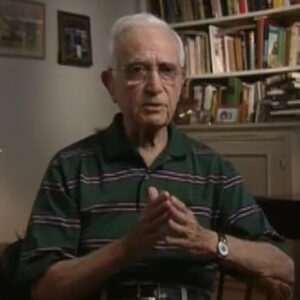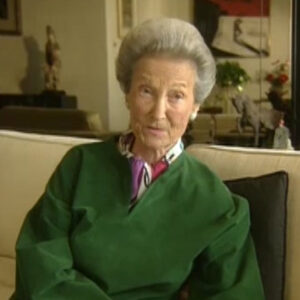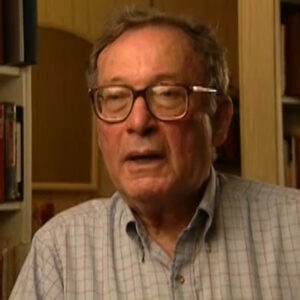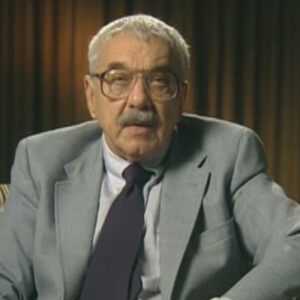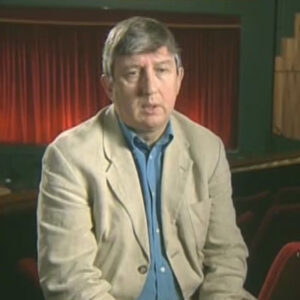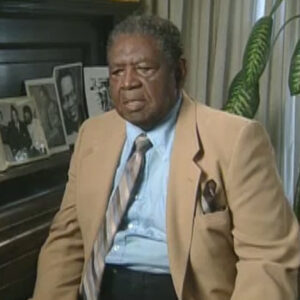Speaker I was always interested in the workers movement generally, and unity seemed to fit my idea as the theater. I also have a great love of the theater, and I joined Unity for that reason.
Speaker Did you do you come from a working class background?
Speaker Oh, yes, yes, I my father was a cabinetmaker. My all my family were craftsmen. My grandfather was a toolmaker in the days when tools were made by hand. My mother was a dressmaker and I personally was a dressmaker by trade.
Speaker And. Well, your family was a political activist.
Speaker Yes, my father was a socialist. He was a great follower of William Morris, I think, because of the fact that he was a craftsman himself. He also was interested in Morris’s political ideas. I remember his children. He read this news from nowhere, which was by William Morris and which, of course, is also based on socialist philosophy.
Speaker When?
Speaker When when the Unity Theatre started. What was the climate like in Europe and what was going on?
Speaker I can only speak as a Londoner. I had never been out of London and London itself was quite exciting at that time, but overhanging all this was the threat from Germany and the rise of the fascist state. We also, even in London, came across this because I was a member of the Tailor and Garment Workers Union and we had a lot of Jewish tailors, immigrants from Greece and Cypriot immigrants, and the Mosley and his lecture would very often smash the windows of these little shops, little Jewish shops. So there was always this rather awful feeling of threat at that time. I’m speaking now about 1937, just a couple of years before the war started, so that although it was an exciting place in many ways, it was also a time of a threat in a way, because of this rise of fascism in Europe.
Speaker You said that London was an exciting time. What was going on? What were some of the things that were going on? Well.
Speaker Culturally, I think it was almost at its peak because at that time, all museums and. Art galleries, Tate Gallery, all these things were free.
Speaker So although we were a I and my friends were working class people, we had access to a great deal of beauty and culture. Also, there was quite a big political movement, there was we we had demonstrations on subjects like come when the international game was taking place, we we marched to try to try to get the government to impose sanctions on them.
Speaker And also there was a movement against the rise of fascism. So there was a tremendous amount going on, both politically, culturally and socially of that time.
Speaker OK, now, was Paul Robeson a fixture on that scene or the presence then?
Speaker Paul, I don’t remember Paul, as I remember I only knew or meant to about 1937 when he came to work at the theater before then, many of us had, of course, heard and liked Paul Robeson. We changed his films and listened to his music and his singing. But he said, I don’t think we ever realized the depth of his political and social feeling at the time. I’ve only I can only speak, of course, for myself and the people that were voted.
Speaker Did well, tell me how you joined Unity Theater and then we’ll talk about.
Speaker Yeah, well, I had a friend who was very keen on acting. She really wanted very much to be an actress. And we had cycled with the Labour League of Youth to Hagerstrom and the Unity came to do a small show revue, I suppose you would call it. And Hilda decided that this is we must join. And for me, I always loved the theatre. And together we joined Unity Theatre from that time.
Speaker You know, and I realize that. Can you what is Unity Theatre? A lot of people don’t know what that is.
Speaker Yeah, well, it was started by a small group of people and I believe the first performance was performed from the back of a lorry and then they.
Speaker Have a church hall. They.
Speaker I suppose.
Speaker They decided early on that this should be a theater of the working class, that, for instance, we never accepted the idea of stars in the show. Everybody was equal with the theater. And then they moved eventually to a place in Kings Cross. If you want to try and. And mostly to the people who worked in the theater were working class people, some were unemployed, of course, a. But mainly, they were youngsters from around London.
Speaker They do a particular kind of play. Yes, we.
Speaker We performed plays which were of working class interest in many ways we did, for instance, Clifford Odets play Waiting for Lefty and we did play. We did, for instance, I’ve forgotten the man’s name. Who wrote it? We did the ragged trousers philanthropists. We did a very good little sketch called Where’s That Bomb? Which was, of course, a skit on the. And plays like that, but they all had a socialist. Philosophy and background to the. I found this very good, very exciting, because it was so nice to have these things brought out onto the stage.
Speaker You have good audiences. You have met big audiences.
Speaker Yes, we we usually had a full house, especially, of course, on a Saturday and times like that. We had trade unions who would come on block, so they film theater quite a lot and it was very well received. We would have labor parties and people like us and. So on the whole, the theater was very successful at that time.
Speaker How did how did Paul Robeson come to you to know about the theater? And what did he do? He yes.
Speaker Well, as far as I remember, it was where Paul was in England, and I imagine I can’t remember who, but I guess somebody got in touch with Paul because we were putting on a play which was called Plant in the Sun. And Paul agreed to play the lead in this play, and that’s when he came to you.
Speaker What was he like? How did people react to him? He was a star.
Speaker Yeah, well, of course, we were very excited. I had always enjoyed seeing porn in films. But when he came, he well, he was big. I was black. They were beautiful. And I fell in love with him as many as the other did and. And he was he he was such a he was such a nice man, he he was kind and friendly.
Speaker He he, um, was friendly with all of us and.
Speaker As you can imagine, we only had one dressing room that we had no star dressing rooms or different, we all had to muck in together. So it was pretty untidy. But Fuller was very methodical. He put all his grease boots and things like that were very carefully put down. And the strange thing was that within a few days they would seem to cut itself. He had this kind of influence, I think.
Speaker Did the White House on what the. How long did the plane go for?
Speaker It didn’t last very long. I can’t remember. I’m afraid how long it was on, but it was not a very long time.
Speaker Were there many discussions between Paul and the actors about social conditions and acting? And there wasn’t much that I can remember.
Speaker He of course, we would discuss the play. We would discuss if he would. He was very helpful about. And in fact, I remember him having a discussion with Al Bass, who in the play played the part of a young Jewish apprentice. And in the play he has to phone his mother and tell her that he’s taking part in a sit down strike, which had never really been heard before. And it was really quite funny because he his mother just cannot understand when he says he’s not coming home that night because he is sitting down in the factory and she’s completely bewildered about this. And I remember Paul Alphin, Rush Alphabet’s, and when she made this phone call, it was really very, very good indeed. It was that the audience loved it.
Speaker I remember that.
Speaker And I remember when Paul he he he managed to get this wonderful sort of atmosphere on the stage on a small stage of a shop floor where the men, because they were. In this particular kind of strike before you’re always taking place in the open air, so there was always the bustle of confrontation, the hostility, but also sympathy and understanding on the part of other people. But here they were completely isolated. And of course, this this made them a bit depressed, they became a bit nervous and despondent, and it’s then that Paul is the shop steward talked to them and he tells them that they’re not alone, that in fact, there are other factors that will come out on strike for in sympathy and that that the idea was growing like a plant in the southern.
Speaker Which was the. Title of the play.
Speaker And he he really somehow he managed to contrive this lovely feeling on the stage of isolation, you know, wondering what’s going on outside.
Speaker Did you get a chance to talk to him a lot? Were you able to talk to him?
Speaker I didn’t tell. I’m I’m always a bit nervous about meeting new people because I was a little bit in awe for that time. You were. And once you were in awe of him. Yes.
Speaker Why? Because he was famous or because.
Speaker I think probably because he was famous and. But you say he was friendly, though he was he was very friendly, and I remember at the end of that year, nineteen thirty seven, we had a party on the stage and Paul danced with me the old year out the new year. And I was really, really thrilled.
Speaker Understand that, you know, after after that plane he left.
Speaker Well, he left pretty soon after that. Yeah.
Speaker Where did he go?
Speaker Well, he went back to America at that time, but he where he was he was very friendly. And I remember one night after a show, I remember him singing to us and he sang and he had this lovely when he sang very softly. And it was really beautiful like this one. And I know sort of a deep sort of bell, you know. And he sang with Lullaby. They sang very softly because we were allowed to make a noise after 11 o’clock because the neighbors complained so.
Speaker And I remember that were you, uh, were you involved in the, uh, the passport campaign at all?
Speaker I wasn’t, because it was soon after that, uh, was. The year 1938, the year 1939, when the beginning of the war broke out and we were all involved with with this and.
Speaker Quite a lot of people had left unity. It was a time of so I don’t remember and I personally wasn’t involved in this, but there were people in London who were involved.
Speaker But I don’t remember you from that time on till till now. You still I think you still seem to have political ideas. You’re still productive and you sculpt.
Speaker Looking back, do you think that Paul Robeson is well remembered as he should be, or do you think many people have forgotten him?
Speaker Oh, I think he is remembered. I.
Speaker I remember a friend of mine when her daughter had her son, she said, you must call him poll after poll because she she also had always like for people to remember him, because when I’ve spoken to people about going to show us meeting the people there, they say, oh, yes, I remember Paul Robeson, you know, in America.
Speaker He was written out of history for a while.
Speaker Yes, I know.
Speaker And I said, well, but that did not happen here. I mean, they didn’t they were aware of the ups and downs that he had.
Speaker No, I don’t think I don’t think they were so much as an American. I think for the general public, he was an actor and a singer and they admired him for that.
Speaker I don’t think they they realized the enormous part he played against apartheid and and also for civil rights. I, I don’t think that didn’t seem to be that sort of awareness that I can remember. He was mostly talked to to them, of course, in the movement. He was much more.
Speaker Interesting discussion. Thank you. One more thing. A couple of things more about the unity theater.
Speaker Uh.
Speaker What was the price of the tickets? Do you remember?
Speaker I don’t remember, not completely, because a lot of the as I said, a lot of the people who came were came on a kind of block booking. You know, they they were.
Speaker But I can’t remember the other thing is how much did you and the other people in the theater group, how much did you get paid?
Speaker Oh, we were never paid. We were all voluntary, really. We were all working in the day. And then we would go straight from work to to the theater and work. No, nobody got paid.
Speaker Do you. Did you.
Speaker Do you think the motivation for the people and being in the theater group, do you think that it was for the love of the theater or was it for the political impact of the work or was it both?
Speaker I think it was both. I think.
Speaker I don’t think it’s I don’t think it was just one thing. I don’t think the motivation was just one kind. I think it was a mixture of enjoying acting and being able to use that.
Speaker In a political sense, it was just that some were more so than the others. It was a mixture, I think, motives.
Speaker Yeah. How many people were in it? More or less. Who? I guess it changed a lot, right?
Speaker Yes, people came and went, there were a few who were always there, people like GhostTown and.
Speaker People were always they were mostly the acting side and of course, and lots of people came and went.
Speaker OK, I ask you the same thing about the Unity Theater, but I ask about Paul Wilson. Do many people remember the Unity Theater? And do you think that it has a presence here?
Speaker I think only those that were involved in it. I don’t think people outside remembers.
Speaker But of course, those of us who worked at the theater remember and probably some of the elderly people who came to the theater who came quite regularly. Some of them. But apart from that, I don’t think it’s because at that time, there were one or two fringe theaters.
Speaker Around London, no, I don’t think industry would have been remembered for self.
Speaker So do you think there’s a need for a unity theater now?
Speaker Oh, yes, I think there is always a need for the expression of what the people are feeling apart from what the establishment puts over.
Speaker OK, do you think that you saw Paul Robeson work?
Speaker Do you think he was successful at doing what you just said?
Speaker Oh, yes, he did. I think he was. I think.
Speaker I’m not sure I put this.
Speaker I mean, he was a popular figure, he had a theater, yeah, the theater conveyed what people were feeling.
Speaker Yeah. The question is, do you think Paul Robeson was successful at conveying what people were thinking?
Speaker Or yes, I think so.
Speaker His films, of course, for instance.
Speaker I think even in the old film The Showboat, for instance.
Speaker I think he’s his.
Speaker His feelings of the slave, for instance, episode affected people and made them think a little bit. Although the film was not at all based on a social studies, but I think the fact that he he saw things like. The way the slaves were, you know, the aching back, so the fact that they’re sick of living and scared of dying and I I think even within those films, he managed to convey this kind of sadness and humility and humiliation of the black people that you saw the other fellow.
Speaker Did you see? Yes, I did. Uh.
Speaker Did you go and talk to him afterwards or did you go to see him after the performance?
Speaker Africans know after last year after the poll. Oh, yes, no, no, I didn’t know they’re still afraid to talk to France.
Speaker What did you think of his performance in Othello when you saw him?
Speaker I thought it was a lose lose, but I’m sure that.
Speaker He was too old for the part, right?
Speaker The. Uh, I think he.
Speaker He was, of course, the right statue and everything, but. I I don’t know, I just he gave a wonderful performance, but I just felt that. It was he was just a bit too, too old to ever be for this. Well, you know, he was ill, he was sick. Yes, I there was and that probably yes, I’m sure this is what what it was.
Speaker Yeah. OK, anything else you want to say about Paul Robeson and his effect on you?
Speaker Did it happen? Did he have any effect on you personally?
Speaker Oh, yes. Yes, he did. Well, it made me much more aware of.
Speaker The struggle of the black people, I am.
Speaker I sort of connect him with this struggle.
Speaker Did it have any effect on your own political activity?
Speaker I know my political activity was mostly within the trade union movement and the local issues.
Speaker OK, I have to run this.
Speaker All right. Oh.
Speaker The the role of the role in that play was written for an Irishman.
Speaker Ah, you didn’t know that?
Speaker I didn’t know. I didn’t remember, of course, at the time. I probably did. I was told the names of the. But these are the things I find difficult to remember, names and dates, things like that. I can remember the visual pictures in my mind clearly, but I can’t remember the oh oh active involved in the Unity Theatre.
Speaker Were there ever any other black actors in the theatre?
Speaker No, I don’t remember. I don’t think so. I don’t think so.
Speaker If you can say. I don’t think there were any. I don’t think there were any others. No, they were. Did you ever meet Paul Robeson’s wife, Essie? No. No, she didn’t come at all.
Speaker I don’t know who I believe. She did come with him. I’m not sure.
Speaker OK. Florence Henderson, Florence is a wonderful story that as a young woman to go to school, Hoshino. You could get her to tell me the story.
Speaker As a child in school, oh, we fly the plane capable of getting on the plane. That’s when I think I understand that.
Speaker In your childhood, your father told you a story about heathens or Africans. Yeah. Could you tell me about that? Oh, yes.
Speaker And at school we had this geography mistress, and she was talking about Africa and she was talking about the people and telling us that these people were heathens. I couldn’t make out quite what she meant. I went home and told my father and he was very cross. And he sat down and with piece on a piece of paper, he drew a child’s skeleton, two children’s skeletons, and he said, that’s a little African girl and that you and there’s no bloody difference.
Speaker And that stayed in my mind forever. I have never forgotten it, and I suppose it’s things like that which makes you think.
Speaker And which influenced my political thinking. OK, OK.
Speaker Anything else you want to say? No, no, it’s wonderful.
Speaker I hope it won’t work, OK.
Speaker Why do you think that Paul was too gentle to play with our.
Speaker Why do you think that?
Speaker Well, I suppose I had got used to thinking about Paul and having met him and. He was such a gentle person.
Speaker He was.
Speaker A real gentleman and and I suppose in a way, I couldn’t imagine him as this rather ferocious, murderous gang unit.
Speaker And my other question is, did Paul ever talk about why he worked with.
Speaker The Unity Theater.
Speaker No, I don’t think he needed to. We knew why he came to unity because he was sympathetic with unities ideas.
Speaker But he was a star. Yes, I know he was.
Speaker Yeah, and why do you think he came to you personally?
Speaker I think he came for that reason, I couldn’t imagine any other star would ever put foot inside to.
Speaker But he was just bigger than that and. He could.
Speaker Paul. Could walk with any man.
Speaker And. I think he.
Speaker Because he was asked to do this because he was sympathetic to our ideas. And I think he was generous enough.
Speaker To accept this part. Where other stars would never have done.
Speaker And for that, we were very grateful and loved him for it.

